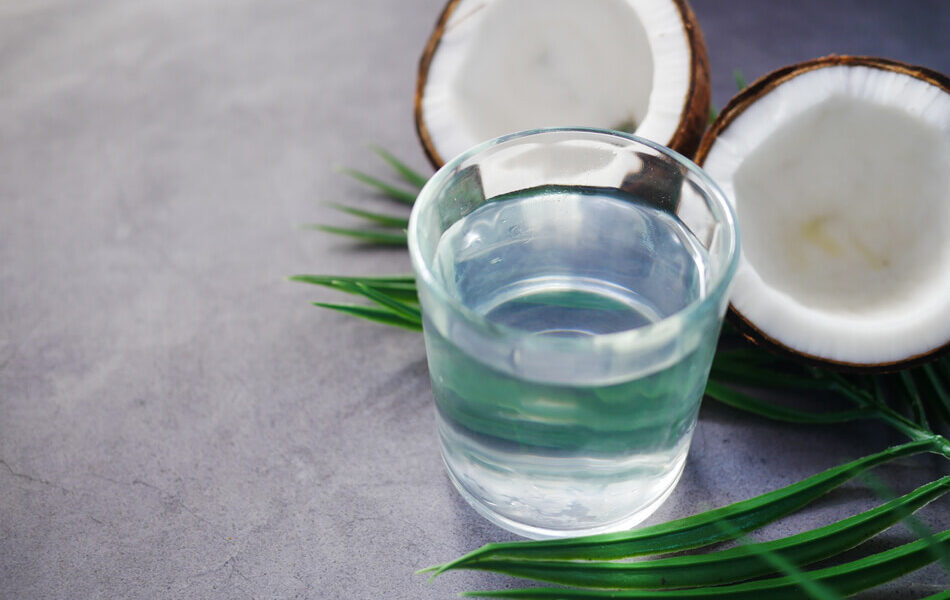Is Coconut Water Good for Weight Loss? Nutrition and Calories
Coconut water is a popular drink among athletes and a sports hydration tool. It’s also used for weight loss purposes, but does it work? Here, we break down the nutritional value of coconut water and help you know if it’s good for weight loss.

There are never dull moments when it comes to coconuts. For example, we started using coconut oil as one of the healthiest sources of fat in our diets in the past couple of years. Its internal meat is considered an excellent source of fiber, and its water is now sold as a hydrating drink worldwide.
In recent years, coconut water has become quite a trendy beverage. In addition to its amazing taste, flavor, and hydration properties, it has several important nutrients, including minerals that many people don’t get enough of. It’s one of the few organic drinks that can offer your body many advantages.
Professional athletes drink coconut water for its performance-enhancing benefits, and famous people swear by it for its health benefits.
But is coconut water effective for weight loss? We explain all there is to know about coconut water and if it’s a good option for weight loss and its benefits.
Is Coconut Water Good for Weight Loss?
Coconut water is an excellent beverage for anyone who wants to lose weight or maintain their current weight. Its low-calorie content and natural enzymes and minerals, such as potassium, fiber, and protein, make it ideal for weight loss.
Coconut water is well known for increasing metabolic rate. With a higher metabolic rate, you will burn more calories during rest and when you’re active. A low metabolic rate means burning fewer calories at rest and during activity. This can make you overweight. That’s one reason why some people can eat less but gain weight.
Poor digestion and high blood glucose levels are linked to weight gain. When blood sugar levels spike, your pancreas releases more insulin to control the level. The body stores fat more easily when insulin levels are high. Additionally, constipation and slow bowel movements can lead to bloating, causing weight gain.
Coconut water is also high in fiber, which helps keep you feeling full after meals and reduces cravings for unhealthy foods. The drink’s taste can help you curb your sweet tooth or cravings for sugary foods that may be causing weight gain. This fiber can also help regulate your blood sugar level and improve digestion.
Coconut water helps lower cholesterol levels. Having high amounts of bad cholesterol in your body not only makes you obese but also increases your risk of cardiovascular disease. Drinking coconut water daily can reduce the amount of bad cholesterol by converting it into bile acid, easily excreted by the body. It also ensures smooth blood flow.
What Is Coconut Water?
Coconut water is the clear liquid found inside young green coconuts. It contains sodium, potassium, and magnesium electrolytes, which can help replenish lost nutrients. This means it can be a good drink post-exercise or during a mild illness – although it cannot replace water.
Only young coconuts can produce water because, as coconuts mature, the liquid becomes coconut meat, used in traditional coconut recipes. Coconut water contains about 95% water. As a result, it can prevent or treat dehydration.
Coconut water is different from coconut milk, which is a combination of coconut water and grated coconut. Coconut oil, on the other hand, is higher in fat and calories, while coconut water is low in sugar and calories.
Coconut water has a slightly sweet, nutty taste, and it’s usually drunk directly from the coconut by drilling a hole in it or cutting off part of it.
Coconut Water Nutritional Value
It’s important to note that nutrition facts may vary slightly depending on where the coconut is sourced and its maturity. Here is the nutrition information for one cup of 100% coconut water (245g) as provided:
- Calories: 44kcal
- Total fat: 0g
- Cholesterol: 0mg
- Sodium: 63.7mg
- Potassium: 404mg
- Carbohydrate: 10.4g
- Total sugars: 9.6g
- Protein: 0.5g
- Calcium: 4% DV
- Magnesium: 4% DV
- Phosphorus: 2% DV
How many calories are there in a glass of coconut water?
One glass of unsweetened coconut water (100g) has 18 calories. Coconut water is low in calories and sugar, which is much lower than packaged fruit juices on the market, such as orange juice or regular soda.
This means coconut water is ideal for you if you’re looking for a drink that’s not very sweet yet with a better concentration of minerals. It’s also good news for those looking for keto-friendly drinks as coconut water is one of them.
What Is the Best Time to Have Coconut Water?
Drinking coconut water early in the morning on an empty stomach can help burn more calories and kickstart your metabolism throughout the day. It also helps relieve morning sickness, which is a common symptom of pregnancy.
However, you can drink coconut water any time of the day. You can have it in the morning before breakfast or as a snack after lunch. You can have it as an afternoon treat or at night before bedtime, but there are specific times when it’s more beneficial to drink.
Drinking coconut water on an empty stomach early in the morning can help in many ways. It contains lauric acid, which helps boost immunity and increases metabolic rate, promoting weight loss.
5 Coconut Water Benefits for Weight Loss
Coconut water can be consumed as part of a healthy diet as it is low in calories, fat-free, and cholesterol-free. In addition to its high-quality nutrition, coconut water has many health benefits that make it worth drinking regularly. The following are some of them:
#1 Boosts hydration
The electrolytes found in coconut water help protect against dehydration by replacing those lost through sweat. This makes coconut water an ideal beverage for people spending long hours outdoors or working in hot weather conditions where they might lose fluids through sweat.
#2 Raises metabolism
The electrolytes found in coconut water help fuel your body’s metabolism, which burns more calories throughout the day. This helps you lose weight by increasing the calories you burn while sleeping or exercising.
Coconut water is also gentle on the stomach. It’s high in bioactive enzymes, promoting digestion and increasing metabolic rate. Fat is broken down quickly due to a higher metabolic rate in the body.
#3 Balances pH levels
Coconut water is alkaline and contains helpful electrolytes that can bring your pH balance back to normal if you suffer acidity. This beverage can relieve heartburn and acid reflux because it soothes inflammation and dilutes stomach acid that refluxes back into the esophagus.
#4 Regulates blood sugar
If you have diabetes, drinking unsweetened coconut water instead of sugary beverages may help you control your blood sugar levels. However, most coconut water has natural sugars, so you’ll need to limit your intake.
The consumption of mature coconut water was shown to reduce hemoglobin A1C and blood sugar levels in animals. In this research, coconut water was found to have high potassium, magnesium, manganese, vitamin C, and L-arginine contents, which improved insulin sensitivity.
#5 Improves blood circulation
Obese and overweight people are usually diagnosed with atherosclerosis – a condition in which plaque builds up in the arteries. Plaque is mostly made up of fat and cholesterol when you aren’t active. Coconut water is rich in arginine and has antiplatelet and anti-inflammatory properties that reduce plaque formation and improve blood circulation. It’s a heart tonic that lowers the risk of heart disease.
Can Coconut Water Make You Gain Weight?
Though coconut water contains fewer calories than juices, sodas, and sports drinks, consuming too much can lead to weight gain as the few calories can pile up over time. It’s therefore essential not to use it as a substitute for plain water.
However, drinking coconut water, in moderation, keeps you hydrated, which prevents fat storage inside the body. Further, this beverage is low on calories and sugars, which, if taken in large amounts, can lead to unwanted weight gain.
FAQs
There is no sugar in coconut water. The only sugar is the natural sugar in the fruit juice. Plain coconut water has about 4 to 6g of sugars per 100ml (1 glass), less than sports drinks or fizzy sweetened drinks.
Coconut water is not fattening. It’s low in calories and sugars. It’s also rich in bio-active enzymes that help boost metabolism, thus helping you burn more fat. However, consuming coconut water in excess will have the calories adding up quickly, causing weight gain.
There are no set rules of how much coconut water should be consumed daily for weight loss. It’s, however, not advisable to drink it all day long. Drink 1 to 2 cups (1 cup is about 240ml) of coconut water daily.
A Word From Our Nutritionist
The best way to consume coconut water for weight loss is fresh from coconut when the coconut is 100% natural and has no preservatives or sugar added. When selecting coconut water at the grocery, choose the ones without added sugar, sodium, or fruit juices. Read the ingredients list to make sure there are no additives. All you should see on the list is one ingredient – coconut water.
Check also the Nutritional Information label. If it has over 50 calories per 8 ounces of serving, you may have added sugar or other forms of calories. Make sure you are drinking pure coconut water. Do not use chocolate, vanilla, or any other flavor that appears on supermarket shelves.
Conclusion
Tender coconut water is a healthy alternative to sweet drinks such as Sports Hydration Formula, fruit juices, or soda. It’s additive-free and packed with nutrients and electrolytes that promote hydration. Another plus is the fact that this wonder drink is fat-free and low in sugar and calories.
It’s a great drink for anyone on the weight loss journey because it helps suppress appetite and promote metabolism. Coconut water for weight loss can be enjoyed any time of the day on an empty stomach or with a meal. If you don’t like the taste, you can mix it with other drinks or use it in smoothies and still enjoy its health benefits.

















































 Select your language:
Select your language: 








